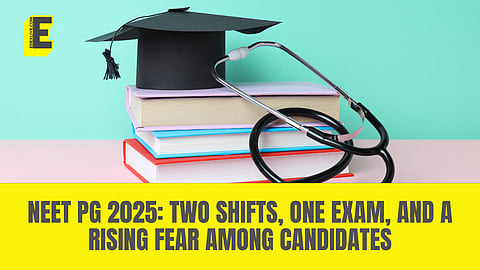

The decision to conduct NEET PG 2025 in two shifts has sparked intense debate among aspirants, with students expressing fear, frustration, and scepticism over the process.
After last year’s controversy surrounding normalisation, candidates now worry that the same lack of transparency could once again impact their future.
The National Board of Examinations in Medical Sciences (NBEMS) announced that the postgraduate medical entrance exam would be held on June 15, 2025, in two shifts. This move has led to strong criticism from students who argue that conducting the exam in multiple shifts increases uncertainty and possible biases in results.
“If elections can be held in one day, why not NEET PG?”
Dr Nidhish, an aspirant appearing for NEET PG 2025, voiced his concerns bluntly, “No student is happy with this decision. If they want to create a system like the US, it takes planning — you cannot decide overnight! If they wish to implement multi-shift exams, then why not do it across all competitive exams in India? Why single out NEET PG?”
Drawing a comparison to elections, he questioned, “If a nationwide election as One Nation, One Election is possible, why can’t an exam with only two lakh candidates be conducted in one shift?”
His primary concern, however, remains the lack of transparency in the normalisation process. He argued that students should be provided with a clear marking scheme, shift-wise results, and individual scores before final rankings are assigned.
He pointed out, “The problem arises when the difficulty level of the exams varies. If authorities want a fair system, both shifts should have questions from the same broader topics. Different subtopics can be covered, but a drastic variation in themes will make it unfair.”
“One shift is easier, one is tougher — where’s the fairness?”
For Dr Dimple Patel, this decision has only added to her anxiety as she prepares for her first attempt at NEET PG. She strongly criticised the move, stating: “Last year’s mess hasn’t even settled, and now they’re doing the same thing again. In two-shift exams, one shift always ends up easier, the other tougher,” she said. She further questioned, “Why should a high-stakes exam be left to chance like this?”
Dr Dimple also raised concerns about bias in the system, where students scoring lower in a tougher shift may find themselves ranked below those who attempted an easier paper. “This is a highly competitive exam. The fear of being caught in an unfair process is real, and it only adds to the pressure we are already facing,” she said.
“We don’t trust the system anymore”
Dr Pradyuman Ravalji echoed these sentiments, questioning whether the authorities have learned anything from last year’s mistakes. “The issue is simple — we don’t trust the system anymore. Last year, many students suffered due to the normalisation process, and it could happen again,” he lamented.
He acknowledged that while the difficulty of a paper is subjective, the perception of one shift being easier than the other is inevitable. For him, a fair solution would be to ensure that the questions across shifts cover the same broader topics, allowing for a more balanced difficulty level. Questioning the decision of two shifts, he said, “If NEET UG, which has far more candidates appearing for it, can be conducted in a single shift, why not NEET PG?”
The core issue: Trust and transparency
While multi-shift exams are common in entrance tests worldwide, the main issue troubling NEET PG aspirants is not the two-shift format itself, but the way normalisation is handled. The lack of clear information about how scores will be calculated and adjusted leaves room for doubt and fear among students.
Unless NBEMS ensures complete transparency in how it evaluates candidates across different shifts, the controversy surrounding NEET PG’s fairness will only grow louder.
